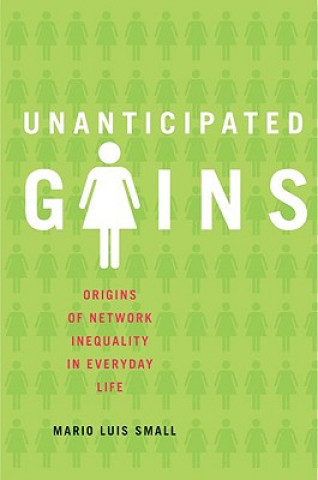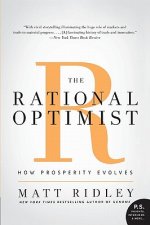
Kod: 04518938
Unanticipated Gains
Autor Mario Luis Small
Social capital theorists have shown that inequality arises in part because some people enjoy larger, more supportive or otherwise more useful networks. But why do some people have better networks than others? Unanticipated Gains a ... więcej
- Język:
 Angielski
Angielski - Oprawa: Twarda
- Liczba stron: 312
Wydawca: Oxford University Press Inc, 2009
- Więcej informacji o książce

Podaruj tę książkę jeszcze dziś
- Zamów książkę i wybierz "Wyślij jako prezent".
- Natychmiast wyślemy Ci bon podarunkowy, który możesz przekazać adresatowi prezentu.
- Książka zostanie wysłana do adresata, a Ty o nic nie musisz się martwić.
Więcej informacji o Unanticipated Gains
Za ten zakup dostaniesz 153 punkty
 Opis
Opis
Social capital theorists have shown that inequality arises in part because some people enjoy larger, more supportive or otherwise more useful networks. But why do some people have better networks than others? Unanticipated Gains argues that the answer lies less in people's deliberate "networking" than in the institutional conditions of the colleges, firms, gyms, and other organizations in which they happen to participate routinely. The book introduces a model of social inequality that takes seriously the embeddedness of networks in formal organizations, proposing that what people gain from their connections depends on where those connections are formed and sustained. It studies an unlikely case: the experiences of mothers whose children were enrolled in New York City childcare centers. As a result of the routine practices and institutional conditions of the centers--from the structure of their parents' associations, to apparently innocuous rules such as pick-up and drop-off times---many of these mothers dramatically increased their social capital and measurably improved their wellbeing. Yet how much they gained depended on how their centers were organized. The daycare centers also brokered connections to other people and organizations, affecting not only the size of mothers' networks but also the resources available through them. Social inequality then arises not merely out of differences in skills or deliberate investments - as the conventional social scientific and political wisdom would have it - but also out of the differences in the routine organizations in which people belong. In addition to childcare centers, Small also identifies the social forces at work in many other organizations, including beauty salons, bath houses, gyms, and churches.
 Szczegóły książki
Szczegóły książki
Kategoria Książki po angielsku Society & social sciences Society & culture: general Social issues & processes
261.81 zł
- Pełny tytuł: Unanticipated Gains
- Podtytuł: Origins of Network Inequality in Everyday Life
- Autor: Mario Luis Small
- Język:
 Angielski
Angielski - Oprawa: Twarda
- Liczba stron: 312
- EAN: 9780195384352
- ISBN: 0195384350
- ID: 04518938
- Wydawca: Oxford University Press Inc
- Waga: 631 g
- Wymiary: 240 × 162 × 26 mm
- Data wydania: 16. July 2009
Ulubione w innej kategorii
-

The Second Sex
34.64 zł -14 % -

White Tears Brown Scars
48.95 zł -14 % -

When Helping Hurts
64.66 zł -13 % -

The Beauty Myth
29.30 zł -15 % -

Violence and the Sacred
166.31 zł -

Wolf Nation
160.16 zł -

Good Immigrant
54.59 zł -

Stuart
51.97 zł -23 % -

Population Wars
81.49 zł -5 % -

The Lucifer Effect
73.63 zł -15 % -

Superforecasting
52.37 zł -15 % -

Sensate Focus in Sex Therapy
175.27 zł -

Pleasure Activism
85.82 zł -4 % -

Drama Of Being A Child
47.34 zł -23 % -

Alcoholics Anonymous Big Book
118.26 zł -

Vulture
65.37 zł -23 % -

Regarding the Pain of Others
51.97 zł -23 % -

Rational Optimist
79.27 zł -13 % -

Poor Economics
52.37 zł -15 % -

Violence
52.37 zł -15 % -

Psychopath Free
79.27 zł -13 % -

Shock Doctrine
70.20 zł -14 % -

The Divide
52.37 zł -15 % -

Silently Seduced
59.02 zł -18 % -

The Feminine Mystique
47.04 zł -14 % -

Toxic Parents
61.14 zł -23 % -

Soft Power
69.90 zł -10 % -

Third Wave
42.60 zł -12 % -

Posthuman Feminism
93.17 zł -

No Logo
52.37 zł -15 % -

Courage To Heal Workbook
128.23 zł -

Illness as Metaphor and AIDS and Its Metaphors
61.14 zł -23 % -

Down and Out in Paris and London
42.70 zł -23 % -

Dopesick
37.77 zł -26 % -

Presence
71.92 zł -13 % -

Facing the Shadow
162.88 zł -6 % -

Last Days at Hot Slit - The Radical Feminism of Andrea Dworkin
73.43 zł -11 % -

A Room of One's Own
38.27 zł -14 % -

Future Shock
43.61 zł -10 % -

Problem that Has No Name
10.77 zł -23 % -

Your Silence Will Not Protect You
65.87 zł -23 % -

Social Animal
61.24 zł -15 % -

Attention Merchants
54.09 zł -15 % -

Who Cooked Adam Smith's Dinner?
51.87 zł -23 % -

Stiff Upper Lip
51.87 zł -23 % -

Power Elite
70.41 zł -23 % -

Eternal Treblinka
84.81 zł -6 % -

Critical Race Theory (Third Edition)
93.17 zł -9 % -

Go Ask Alice
42.70 zł -23 %
zadowolonych klientów
Od roku 2008 obsłużyliśmy wielu miłośników książek, ale dla nas każdy był tym wyjątkowym.
Copyright! ©2008-24 libristo.pl Wszelkie prawa zastrzeżonePrywatnieCookies



 21 milionów książek
21 milionów książek Dostawa 10.99 zł
Dostawa 10.99 zł (32) 444 93 66 (8-15.30h)
(32) 444 93 66 (8-15.30h)